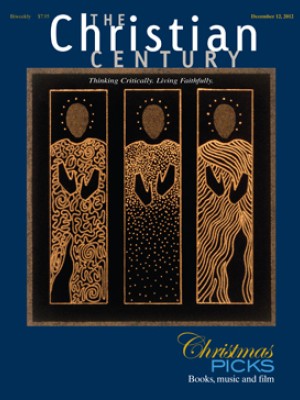Revolutionary words

He has brought down the powerful from their thrones, and lifted up the lowly; he has filled the hungry with good things, and sent the rich away empty. (Luke 1:52–53)
These are powerful words, revolutionary words. They belong not to Karl Marx, but to Mary.
Christians have always been uncomfortable with these words sung by Mary, in the canticle known as the Magnificat. I read that when Luther translated the Bible into German, he left the Magnificat in Latin because the German princes who supported Luther’s struggles with Rome took a dim view of the mighty being brought down from their thrones.
Read our latest issue or browse back issues.
Advent takes us places we would rather not go. It begins with a sweet story that has a decided edge to it. A young, unmarried girl was pregnant, and that was not good news. She was promised to an older man but then had a dream in which she was told that God had chosen her to bear a child. Unaccountably, bravely, Mary, perhaps only 14 years old, consented. “Let it be to me according to your word.” That moment of annunciation and consent has been painted many times, perhaps most strikingly in Fra Angelico’s The Annunciation in the San Marco convent in Florence.
But unlike the demure, submissive Mary featured in Fra Angelico’s painting, Luke’s Mary is talking about a revolution, an upheaval in values, an overturning of conventional mores.
What do those of us who are decidedly not poor make of this revolution? We invest so much creative energy in “wanting” that we become economic units listening to the cultural voices that tell us that buying, having and accumulating will make us happy and content. In his essay “Economics and Pleasure,” Wendell Berry writes: “It is astonishing . . . to see economics now elevated to the position of ultimate justifier and explainer of all the affairs of our daily life.” Berry says: “Decide to live by the laws of mercy and justice.”
Since Jesus seems to have had friends and followers who were people of means, it is difficult to argue that Christianity is solely about social reform. It is more than that. It is about true human need.
The problem with the rich people in the Bible is that they don’t seem to have any needs, while poor people know that they are poor and have plenty of needs. They also know, unlike their wealthier counterparts, that they are dependent on others. That’s the point. Luke’s Mary knows that the things of real value in this world are the gifts that we do not earn ourselves: beauty, friendship, people to love.
The Magnificat teaches a simple truth: you cannot receive a gift unless you have a place for it in your life. You cannot learn anything if you think you know it all. You cannot receive love unless you know there is a place in you that is empty and needs love to fill it.






